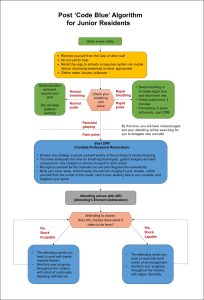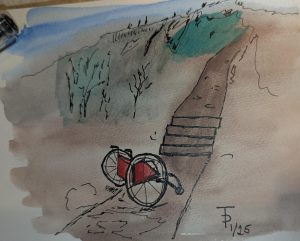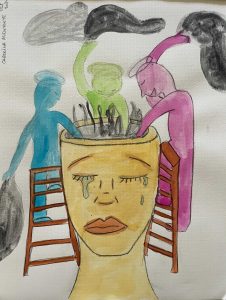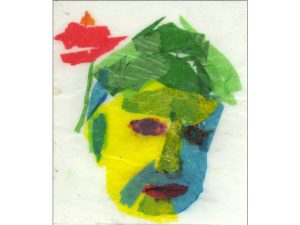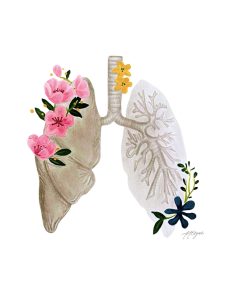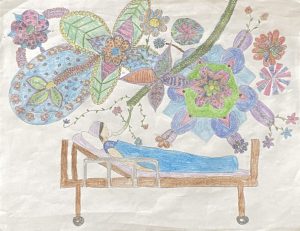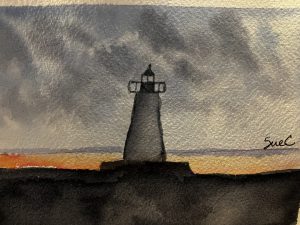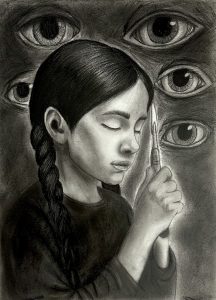- Home
- /
- Latest Voices
- /
- Page 7
Latest Voices
Tears Aren’t Always Bad News
I have chest pain again. Chest pain and dizziness and shortness of breath. So I am in the ER for the dozenth time over the past few years.
And because no one ever knows what’s going on (because I’m a woman of a certain age and all the tests are negative), we all assume it’s just one of those things. It will go away. Or it won’t.
“But don’t hesitate to come in when you have the symptoms again.”
Of a Gun and a Cigarette
Today, while sitting with my kids in a cafe at a busy intersection, I saw a man stick his arm out of a car window. I spotted a metallic glint in the afternoon sun. I couldn’t see his face due to the glare through the cafe window. But I could see him point his arm and hold it horizontally in my direction.
I flinched. I went into survival mode. I told my kids calmly but firmly to move their chairs away from the window immediately. When they asked why, as they noisily scraped their wooden chair legs against the polished
The Instigator
He answers the door wearing only a button-down shirt and incontinence briefs, no pants, paper towels in one hand, his walker out of reach on the other side of his assisted-living apartment.
“Who are you?” His brow crinkles as his dark eyes bore into me, vacant yet suspicious.
“We met here last month,” I say. I reintroduce myself as his new primary care provider and remind him that he was referred to me by his longtime, beloved clinic-based doctor for home-based primary care.
Grief Around Every Corner
I’ve started asking women about their grief. Today, I was taking a medical history from a colleague, and she told me she had lost twin girls. They were stillborn. I asked her to tell me how it happened.
It was one sad accident after another. She couldn’t feel her babies moving at 38 weeks and then went into labor. She’d been told that she would have an elective C-section at 36 weeks, but for some reason her caregivers changed their minds. By the time she was in the labor and delivery ward, the babies didn’t have a heartbeat.
Window of Truth
My stepfather, Roddy, was known for being a hypochondriac. My mother used to say, “If he sneezes, it’s a medical emergency. But he’ll outlive us all.”
This time was different, however. He’d stopped eating, was silent, had no complaints. His oldest daughter convinced him to go to the emergency room. At first, he seemed relieved he’d see his doctor, who, he was sure, would tell him nothing was wrong. Roddy laughed, discussed politics, and reminisced.
Due to some “worrisome but inconclusive” lab results, he was admitted. In the hospital, a wild goose chase began, sidetracked by red herrings. While we
Childhood Memories Awakened
All my childhood summer memories revolve around the pool in our backyard. Shamu floats. Diving for coins. Endless laps to create a whirlpool. Reenacting iconic scenes from Titanic on days when the water was cold.
All those days at the pool also meant a childhood full of sunburns. Though my parents slathered me in sunscreen, I burned easily. I have fair skin—fair enough that I always select the lightest tone when choosing a foundation. I also have too many moles to count. My sole saving grace is that, as a 20-something in the early 2000s, I never got in a
Chaos
Feel free to call me Dorothy—you know, the girl in the Wizard of Oz who was consumed by a tornado and deposited in an alien land with no anchor but her dog Toto.
Chaos consumes me. As I sit typing this, my desk is littered with a full water bottle, a pill box, bills, scissors, a calendar, a mouse, some essential oils, pens, a Kleenex box, an empty water bottle, a stack of who-knows-what-they-are papers (actually, three stacks), some stuffed animals, an eyeglasses holder, a keyboard duster, some jewelry—I can’t even continue to list all the items.
The Madonna
They must have given me something for sleep. My last memory was Madonnas, filled with tears in their eyes. Madonnas?
When I awoke, the lights were out and the door was closed. I could hear voices in the hallway but couldn’t make out what they were saying. I could feel my naked skin as it rubbed against the scratchy sheets. I started to get out of the bed, but I discovered that I was restrained by the side rails.
It’s Probably Nothing
As a third-year medical student, I’m used to being tired and stressed, and like many of us in training, I tend to neglect my own health. “It’s probably nothing,” I told myself. “I’m overthinking it. Illness anxiety disorder.”
But I’d always been unusually sensitive to cold. Since childhood, my hands and feet would freeze, turning pale, numb, sometimes bluish. I thought it was just a quirky trait. Then I learned about Raynaud’s phenomenon in class, and my classmates and I joked: “You totally have that.”


